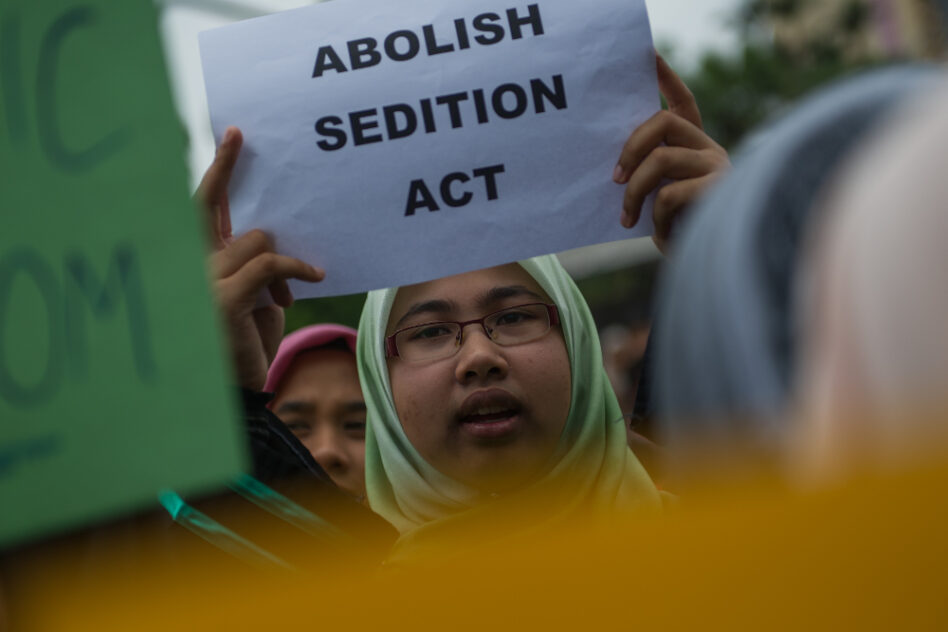THE Sedition Act 1948 is a legislative measure that was enacted in Malaysia during the colonial era, designed to curb any form of speech or expression that was deemed to be seditious in nature with the aim of maintaining public order and security.
The Sedition Act has been subject to much debate and criticism, with some arguing that it is a violation of freedom of speech and expression. Despite this, the Act remains in force in Malaysia to this day, albeit with some amendments made over the years.
Although I concur with the abolition of this Act, it is imperative that a comparable new legislation be enacted to address the escalating prevalence of racially and religiously bigoted remarks that have been unsettling our distinctive multicultural and multi-religious society as of late.
An instance that exemplifies the prudent decision-making of the governing body is the substitution of the Internal Security Act of 1960 with the Security Offences (Special Measures) Act 2012 (SOSMA).
This replacement can be perceived as a strategic move to harmonise with the ever-changing legal framework and fulfil the aspirations of the general public.
The Sedition Act outlines a comprehensive definition of sedition, encompassing various forms of expression such as acts, speeches, words, publications, and other means that possess a seditious tendency.
Section 3(1) of the Act specifies that acts with a seditious tendency include those capable of inciting hatred, contempt, or disaffection against any Ruler or Government, as well as those seeking to effect changes to established matters through unlawful methods.
Furthermore, the Act criminalises the promotion of feelings of ill-will and hostility between different races and classes of Malaysians.
In summary, the Act prohibits speech that demonstrates a seditious tendency, which encompasses expressions that may incite hatred, contempt, or disaffection towards the government, as well as those that foster animosity and hostility between different racial and social groups.
The Act was used to suppress political dissent and opposition to the ruling government, resulting in numerous arrests and prosecutions.

In the case of Mat Shuhaimi Shafiei, the Malaysian Federal Court of Appeal declared a section of the Sedition Act unconstitutional. This section criminalised the publication of seditious material without requiring the accused to possess the necessary criminal intent (mens rea).
The Court justified its decision by stating that nearly every crime necessitated proof of criminal intent, and that the law in question established a strict liability offense, which unduly restricted the freedom of expression guaranteed by Malaysia’s Federal Constitution.
In the case of Public Prosecutor v. Azmi Bin Sharom, the defendant, a law professor at University Malaya, was charged with sedition on Sept 2, 2014, for comments made on an online news article. Sharom contested the constitutionality of the Sedition Act, citing its colonial origins.
The court subsequently issued a landmark ruling, affirming the constitutionality of the law. On Feb 12, 2016, the Attorney General elected to withdraw the charges against Sharom.
The Sedition Act had far-reaching consequences across various domains of society.
First, it significantly impacted freedom of speech and expression, as individuals were subjected to legal scrutiny and potential prosecution for expressing dissenting opinions or criticising the government.
This curtailment of civil liberties had a chilling effect on public discourse and stifled democratic participation.
Moreover, the act had profound implications for political dissent and opposition movements. By criminalising acts of sedition, the government effectively suppressed opposition voices, hindering the development of a robust and pluralistic political landscape.
This, in turn, limited the avenues for constructive dialogue and impeded the democratic process.
Furthermore, the Sedition Act had a profound impact on the media landscape. Journalists and publishers faced increased scrutiny and self-censorship, fearing potential legal repercussions.
This resulted in a climate of restricted press freedom, where the dissemination of critical or alternative viewpoints was curtailed, thereby undermining the role of the media as a watchdog and catalyst for societal progress.
In a nutshell, the Sedition Act left an indelible mark on the socio-political fabric of the time. Its implementation had significant implications for freedom of speech, political dissent, and media freedom.
Based on a comprehensive understanding of the historical context and a thorough analysis of the multifaceted consequences of this legislation, it is my firm belief that the current administration, under the leadership of Prime Minister Datuk Seri Anwar Ibrahim, should take the necessary steps to abolish this legislation that originated from the colonial era and was designed to serve a specific purpose.
The surrender of the Communist Party of Malaya should serve as the definitive moment marking the end of this legislation. Regrettably, for political reasons, this has yet to occur.
While I acknowledge the necessity of such laws in the present to address the growing issue of racial and religious seditious remarks, it is imperative that a new legislation be enacted to suit the current dynamic environment in Malaysia and effectively tackle these challenges. – Oct 4, 2023
R Paneir Selvam is the principal consultant of Arunachala Research & Consultancy Sdn Bhd (ARRESCON), a think tank specialising on strategic national and geo-political matters.
The views expressed are solely of the author and do not necessarily reflect those of Focus Malaysia.
Main pic credit: VOA









